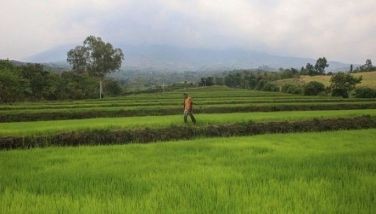Overaged SK officials still want to run
March 25, 2002 | 12:00am
Five 20-year-old members of the Sangguniang Kabataan (SK) in barangays have asked the Supreme Court to allow them to run for re-election on July 15 despite a new law disqualifying them as candidates for being overage.
Republic Act 9164, the law which synchronized barangay and SK elections this year, reduced the age of SK members from 15-21 to 15-"less than" 18 years old.
In their 40-page petition, Antoniette Monteclaros, Maricel Caranza, Josephine and Ronald Atangan, and Clariza Decena said they are "actually more experienced and matured" to be in public service than the under-18 SK members.
"We are of legal age, are more equipped and qualified than SK members between ages 15 but below 18," read a part of the petition. "There are 15 million SK officials and members nationwide, seven million of whom were allegedly discriminated against by the new law."
Through lawyer Abraham Mantilla, the five said Congress failed to hold public hearings that could have allowed them to "ventilate our points of view" before deliberating on the 15-21 age qualification which had been there for 20 years.
"There are no valid reasons why the youth ages 18 but less than 21 years old shall now be punished for the forthcoming SK elections without the observance and clear violations of due process and equal protection clause of the Constitution," read a part of the petition.
The five youth leaders said since youths between 15 to 17 years old are minors under the law, they might meet "a lot of restrictions" once elected as SK members, and that projects of barangays would suffer.
"Being minors and children, they have lots of restrictions, among others signing of contracts, traveling abroad and the like necessitate parental consent," read a part of the petition.
"Their election might negate the enhancement of the social, political, economic, cultural, intellectual, moral and physical development of the country’s youth."
Another lawyer, Michael Roa said the national government allocates to the SK a yearly budget of P2.5 billion which is distributed among the more than 42,000 barangays nationwide.
"The poorest barangay in the country gets about P80,000 per annum, which will be at the disposal of its chairman and seven councilors," he said.
"A barangay in a highly urbanized city, just like Barangay Bel-Air in Makati, gets an average of P6.6 million yearly from the government." – Delon Porcalla
Republic Act 9164, the law which synchronized barangay and SK elections this year, reduced the age of SK members from 15-21 to 15-"less than" 18 years old.
In their 40-page petition, Antoniette Monteclaros, Maricel Caranza, Josephine and Ronald Atangan, and Clariza Decena said they are "actually more experienced and matured" to be in public service than the under-18 SK members.
"We are of legal age, are more equipped and qualified than SK members between ages 15 but below 18," read a part of the petition. "There are 15 million SK officials and members nationwide, seven million of whom were allegedly discriminated against by the new law."
Through lawyer Abraham Mantilla, the five said Congress failed to hold public hearings that could have allowed them to "ventilate our points of view" before deliberating on the 15-21 age qualification which had been there for 20 years.
"There are no valid reasons why the youth ages 18 but less than 21 years old shall now be punished for the forthcoming SK elections without the observance and clear violations of due process and equal protection clause of the Constitution," read a part of the petition.
The five youth leaders said since youths between 15 to 17 years old are minors under the law, they might meet "a lot of restrictions" once elected as SK members, and that projects of barangays would suffer.
"Being minors and children, they have lots of restrictions, among others signing of contracts, traveling abroad and the like necessitate parental consent," read a part of the petition.
"Their election might negate the enhancement of the social, political, economic, cultural, intellectual, moral and physical development of the country’s youth."
Another lawyer, Michael Roa said the national government allocates to the SK a yearly budget of P2.5 billion which is distributed among the more than 42,000 barangays nationwide.
"The poorest barangay in the country gets about P80,000 per annum, which will be at the disposal of its chairman and seven councilors," he said.
"A barangay in a highly urbanized city, just like Barangay Bel-Air in Makati, gets an average of P6.6 million yearly from the government." – Delon Porcalla
BrandSpace Articles
<
>
- Latest
- Trending
Trending
Latest
Trending
Latest
Recommended






























